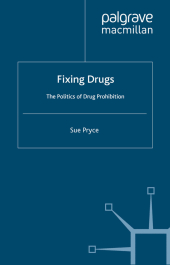 Neuerscheinungen 2012Stand: 2020-01-07 |
Schnellsuche
ISBN/Stichwort/Autor
|
Herderstraße 10
10625 Berlin
Tel.: 030 315 714 16
Fax 030 315 714 14
info@buchspektrum.de |

S. Pryce
Fixing Drugs
The Politics of Drug Prohibition
2012. 2012. xx, 173 S. 216 mm
Verlag/Jahr: SPRINGER PALGRAVE MACMILLAN; PALGRAVE MACMILLAN UK 2012
ISBN: 0-230-35971-X (023035971X)
Neue ISBN: 978-0-230-35971-0 (9780230359710)
Preis und Lieferzeit: Bitte klicken
In this unique and engaging book, Sue Pryce tackles the major issues surrounding drug policy. Why do governments persist with prohibition policies, despite their proven inefficacy? Why are some drugs criminalized, and some not? And why does society care about drug use at all? Pryce guides us through drug policy around the world.
Introduction Why are Drugs a Problem for States? Why is there a Drug Problem at all? How do States Prohibit Drugs? What are the Unintended Consequences of Drug Prohibition? Why Persist with a Failed Policy? Is the Attempt to Prohibit Drugs Coming to an End? Conclusion Glossary Bibliography
Featured as a Times Higher Education book of the week.
´An excellent overview of a complex issue that should be a useful source for anyone interested in the origins, current status and possible future directions of drug and alcohol policies, particularly in relation to prohibition, and the author should be congratulated on this major achievement.´ Professor David Nutt, Times Higher Education
´In this book, Sue Pryce attempts to unravel the Gordian Knot of drug policy and concludes there is no solution to the drug problem- ´it is unsolvable´. What might appear at first as a counsel of despair is in fact an insightful perspective. It enables the reader to move beyond the traditional polarised debates and the all embracing solutions which both sides promote to mirror and reinforce their supporters´ ethics and values. Whatever view one holds, this book explores the pros and cons of different policies. At the end of the day, policymakers have to ameliorate the harms that both drugs and drug policy can create. They should read this to help them think about which course to steer.´
- Roger Howard, Chief Executive, UKDPC (UK Drug Policy Commission)
SUE PRYCE Associate Professor at theSchool of Politics and International Relations, University of Nottingham, UK, where she teaches modules on politics and drugs, narcoterrorism, and american politics. She is a trained substance misuse counsellor and a former chair of DrugScope, the drugs information charity.


